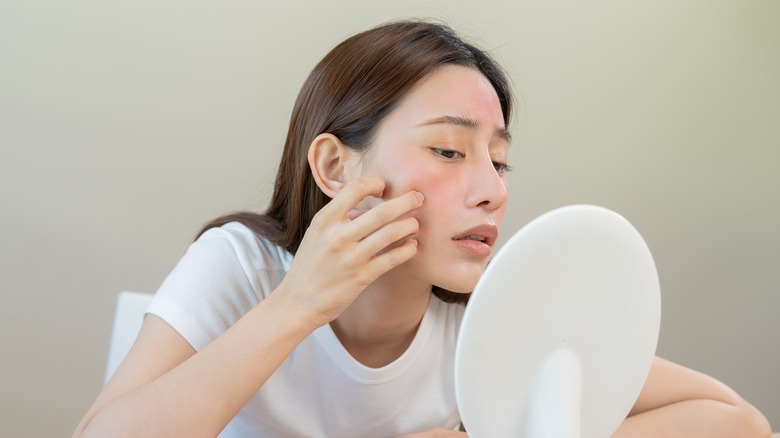The Surprising Link Between Eczema And Mental Health Struggles
Dry, scaly patches of skin that cause itchiness that gets in the way of your everyday life are characteristic of eczema. Eczema has been commonly associated with children, but it can happen to anyone at any age. According to the National Eczema Organization, 31.6 million Americans have some form of this itchy, sometimes painful, condition.
Eczema, a type of atopic dermatitis, can be caused by several factors, according to the Cleveland Clinic. For example, eczema could be the result of your family tree and health history. If someone in your family has a type of dermatitis, or if you have a personal or family history of asthma or hay fever, you could be at risk for eczema. It happens when your skin overreacts to allergens, irritants, and even changes in the air's humidity.
We've always known that eczema can cause itchy skin, but according to new research, eczema can also be related to problems with your mental health, per Medical News Today.
Eczema increases risk of anxiety and depression by 63%
According to Medical News Today, several studies in the past have found that eczema increases the risk of anxiety and depression, but the results have varied greatly. However, researchers have reviewed the best available evidence in twenty studies to better understand the association between eczema and mental health. Research published in the PLoS ONE journal discovered that eczema correlated with a 64% higher risk of depression and a 68% higher risk of anxiety.
The authors of the study believe that side effects of having eczema, like sleep disturbance and avoiding social environments, could be tied to anxiety and depression. Beth Goldstein, a dermatologist at Central Dermatology Center and co-founder of Get Mr., told Medical News Today, "Social isolation and stigmatization can certainly occur as many patients experience their dermatitis on areas of their bodies that are public such as the face, neck, and hands."
Researchers believe that there may be a cycle between stress, inflammation, and eczema flare-ups. Dr. Vivian Shi, a dermatologist at the University of Arkansas for Medical Sciences and expert panelist for the National Eczema Association, said, "Treating the mental health component of eczema alongside the physical symptoms is crucial to maximize treatment benefits" (via Medical News Today).


